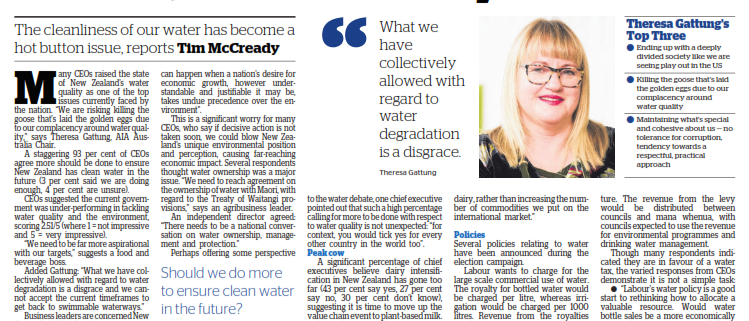http://bit.ly/TimMcCreadyWater
Tim McCready
Many CEOs raised the state of New Zealand’s water quality as one of the top issues currently faced by the nation. “We are risking killing the goose that’s laid the golden eggs due to our complacency around water quality,” says Theresa Gattung, AIA Australia Chair.
A staggering 93 per cent of CEOs agree more should be done to ensure New Zealand has clean water in the future (3 per cent said we are doing enough, 4 per cent are unsure).
CEOs suggested the current government was under-performing in tackling water quality and the environment, scoring 2.51/5 (where 1 = not impressive and 5 = very impressive).
“We need to be far more aspirational with our targets,” suggests a food and beverage boss.
Added Gattung: “What we have collectively allowed with regard to water degradation is a disgrace and we cannot accept the current timeframes to get back to swimmable waterways.”
Business leaders are concerned New Zealand’s “100 per cent Pure” slogan may not be sustainable unless corrective action is taken. Last month, the Al Jazeera channel launched a two-part investigation into New Zealand’s water quality. The documentary – Polluters Paradise – focuses on the impact dairy farming has had on rivers and lakes, and asks whether New Zealand’s waterways are “as sparkling as the tourist ads suggest?”
The investigation claimed there were “troubling questions about what can happen when a nation’s desire for economic growth, however understandable and justifiable it may be, takes undue precedence over the environment”.
This is a significant worry for many CEOs, who say if decisive action is not taken soon, we could blow New Zealand’s unique environmental position and perception, causing far-reaching economic impact. Several respondents thought water ownership was a major issue. “We need to reach agreement on the ownership of water with Maori, with regard to the Treaty of Waitangi provisions,” says an agribusiness leader.
An independent director agreed: “There needs to be a national conversation on water ownership, management and protection.”
Perhaps offering some perspective to the water debate, one chief executive pointed out that such a high percentage calling for more to be done with respect to water quality is not unexpected: “for context, you would tick yes for every other country in the world too”.
Peak cow
A significant percentage of chief executives believe dairy intensification in New Zealand has gone too far (43 per cent say yes, 27 per cent say no, 30 per cent don’t know), suggesting it is time to move up the value chain event to plant-based milk.
Several business leaders say expansion on to marginal land that is unsuitable for dairy farming is causing lasting damage: “We are doing things with some land that is not naturally aligned. Long term, that will have an impact,” says a capital markets head.
“New Zealand has reached peak cow,” says a major banking chief executive. “The focus should move to creating more added value from dairy, rather than increasing the number of commodities we put on the international market.”
Policies
Several policies relating to water have been announced during the election campaign.
Labour wants to charge for the large scale commercial use of water. The royalty for bottled water would be charged per litre, whereas irrigation would be charged per 1000 litres. Revenue from the royalties would go to regional councils, with the expectation it would be used to keep waterways clean.
Labour’s finance spokesman Grant Robertson says the likely rate for irrigators would be somewhere between 1 or 2 cents per 1000 litres.
The Green Party also wants to charge for the sale and export of bottled water, putting a 10 cent levy on its sale and export, which would be applied at the point of manufacture. The revenue from the levy would be distributed between councils and mana whenua, with councils expected to use the revenue for environmental programmes and drinking water management.
Though many respondents indicated they are in favour of a water tax, the varied responses from CEOs demonstrate it is not a simple task:
- “Labour’s water policy is a good start to rethinking how to allocate a valuable resource. Would water bottle sales be a more economically sustainable export than dairy?” Craig Stobo, Chair, Local Government Funding Agency
- “Focus on where water is used and/or polluted – agriculture rather than the small percentage in bottled water.” Food and beverage boss
- “This is not just a rural issue. Many cities have woeful sewage management and this needs to be addressed as well.” Agribusiness chief.




Leave a Reply
Want to join the discussion?Feel free to contribute!